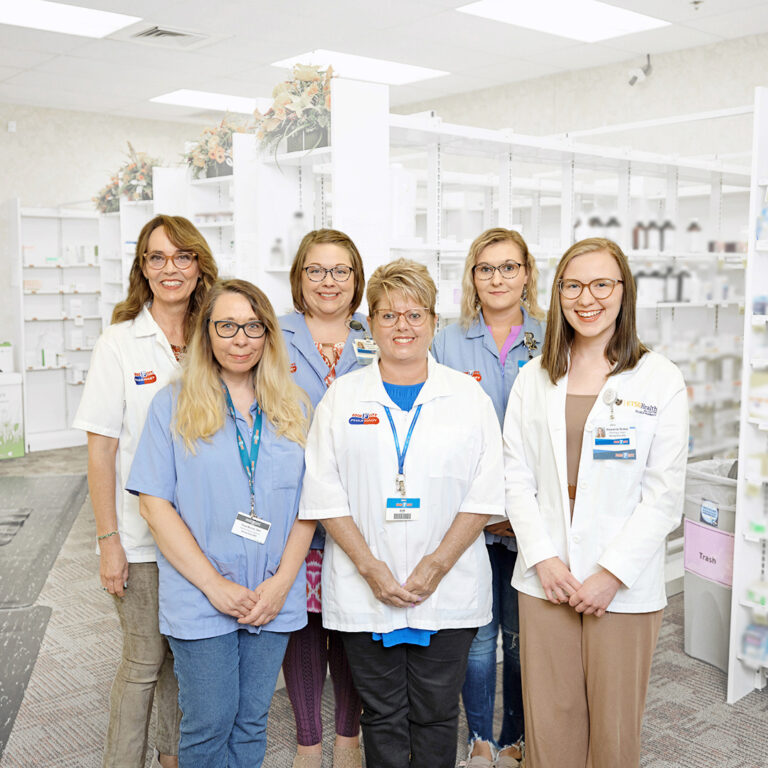
Years in pharmacy
Praise from customers
“They are there to help me or answer any questions. They take wonderful care of my family and me.”
“A doctor recommended a medication for me. I asked the pharmacist about it, and she really helped me! She said I shouldn’t take it because it would put me at a higher risk of having a deep vein thrombosis because of my blood condition.”
If there’s a common thread among the interactions that take place at the pharmacy in Food City #663 in Greeneville, Tennessee, it’s family.
“You’re more than just a prescription here,” says pharmacy technician Ronda Booher, CPhT. “You’re a person, and you’re our family. You become our family, and just like we would take care of our mothers and dads, we’re going to give you that same service, give you that same attention.”
That commitment is reflected in the generations of families who visit the pharmacy’s counter. “We get to know our patients’ extended families because our customers will bring their parents, siblings, or grandparents with them, or their kids or grandkids will begin coming in,” Booher says.
The team is led by pharmacy manager Judi Broyles Beard, R.Ph. Under her guidance, this dedication to fostering a sense of community not only influences the team’s interactions with pharmacy customers but also shapes the core principles of the team’s work ethic and values.
“I lead by example; I don’t ask my team to do anything that I won’t do,” Broyles Beard says. “A lot of times I’m the cashier as well, and because we’re a smaller pharmacy, we try to encourage everybody to work together. When I interview someone for a job, I tell them … this is a place where we are a team and we have to work together.”
In addition to Beard and Booher, the staff includes Carol Souther Smith, R.Ph.; Tonya Minnick, CPhT, lead technician; Amanda Landers, pharmacy technician; and Amaranda Stokes, pharmacy intern.
These team members routinely check to see whether patients are eligible for routine vaccinations, from shingles to pneumonia shots, in case they are overlooked during wellness exams at their physicians’ offices.
As a pharmacy located on the outer edge of Greeneville, this attention to detail is especially important; the Food City #663 team serves a diverse population, from rural customers who travel into the city for care, to Medicaid and Medicare patients who have unique needs and challenges. That makes finding the best possible prices for customers essential—something this team takes to heart.
The team also finds ways to contribute to the greater Greeneville community, not just their pharmacy patients.
“Our team has flu clinics each year to help our customers,” Souther Smith says. “We also are involved in the juvenile diabetes program to help raise funds, and we participate in the food drive and pet hunger drive. Our pharmacy team is also active in community service with area churches and sports.”
Their team dedication to patient care is what led to their customer nominations for a 2023 Best of the Best Pharmacy Award—and it’s the consistent stories of outstanding service that led them to be named a winner. Here, Booher, Broyles Beard, and Souther Smith share more about their approach to serving customers and how their team works together.
Tell us about the community you serve and how that impacts your approach to service.
Judi Broyles Beard, R.Ph. (pharmacy manager): It’s not a wealthy area. Everybody is looking for the best price, and we try to keep a watch on things. We try really hard—especially if patients transfer all their prescriptions here—to check each one and make sure we get them the lowest price possible. A lot of people would not be taking their medicine at all if it weren’t for savings options. They just can’t afford them.
Ronda Booher, CPhT (pharmacy technician): If we run a prescription through a patient’s insurance and it’s a high price, we try to find them a better one. We always make a note to say, “Your insurance was going to be this much, but this is what we did.” Patients are often taken aback because if they come from other pharmacies, they don’t get that kind of service.
How do you educate patients about their medications?
Broyles Beard: With every new prescription, we counsel each individual. Even if they’ve had that prescription for many years, we always try to tell them something they may have forgotten, like the best way to take it or the best way to store it. If we have questions, we call the doctor, or we call patients just to make sure they’re okay with side effects they may be having. It’s a team effort.
Carol Souther Smith, R.Ph. (pharmacist): In addition to explaining medications to people, we look for drug interactions, allergies, and duplicate therapy.
What is your team dynamic like?
Booher: We have awesome leaders (Judi and Carol). We all mesh together really well. The expectations are clear, and communication is key. If there’s a question, we ask. If we aren’t sure about something, we don’t hesitate to say, “Hey, can you look at this with me?” As a team, you have to be able to communicate with your coworkers in order to get the job done and get it done the right way.
Broyles Beard: We strive to work as a team. All of my technicians work together to check different medication prices, and even though that is time-consuming and patients may have to wait a bit longer, they always appreciate that effort. While they do that, Carol and I are looking for potential drug interactions.
I’ve always told the staff that we want to do what we wish someone would do for us or our parents. A lot of times I’ll notice that there’s little conversation among us, but we’re all working together in a flow. By the time the medication gets to the register, everything is taken care of and the customer is happy.
How do you ensure your patients get the medications they need?
Booher: Every day, we go the extra mile to make sure our patients are able to get their medication. If it requires a prior authorization, we’re constantly in contact with the doctor or the insurance company to get that approved as quickly as possible for the patient and to give them the best price that we can. It’s an everyday occurrence here.
That’s one of the things that breaks your heart on the job. We have a lot of our people, especially our older population, who don’t draw enough money and they’ll come and say, “I’m going to have to wait on it.” We don’t want patients to have to choose between vital things like groceries or their medications. We’ll call the doctor and tell them the medication is out of their price range, and they’re really good at working with us.
How do you strive to make a difference in the community that you serve?
Souther Smith: Food City has several programs that we participate in such as “Race Against Hunger,” where we provide funding for the hungry by asking customers to donate. We also have a food drive where we collect food for the local food bank and ask for donations for the American Diabetes Foundation.
Our pharmacy also donates to the Pat Summit Foundation for Alzheimer’s in which a portion of every flu shot that we give goes to this foundation. Our School Bucks program is linked to a customer’s Food City value card, so the customer chooses a particular school to support. Funds collected from this program go to the school to invest in classrooms.
Why is it important for your team to have a presence in the community?
Souther Smith: It’s important to be active in our community and to get to know our customers better so that we can help in any way possible. We want to be known in our community so that we can build trust with our clients. Many of our customers see us outside of the pharmacy. It makes it easier to have conversations about drug therapy when they know us better.
What does your team to go above and beyond?
Booher: Whether patients have been coming here for 10 years or just 10 months, we always try to do more than simply say, “Here’s your medicine.” We talk about what’s going on with their health. We try to get to know what they want and expect from us. And we try to get to know them so they become part of our family. And because they are part of our family, we treat them like that—we give them the treatment that we would want our family to receive.
Praise from customers
“They are there to help me or answer any questions. They take wonderful care of my family and me.”
“A doctor recommended a medication for me. I asked the pharmacist about it, and she really helped me! She said I shouldn’t take it because it would put me at a higher risk of having a deep vein thrombosis because of my blood condition.”

